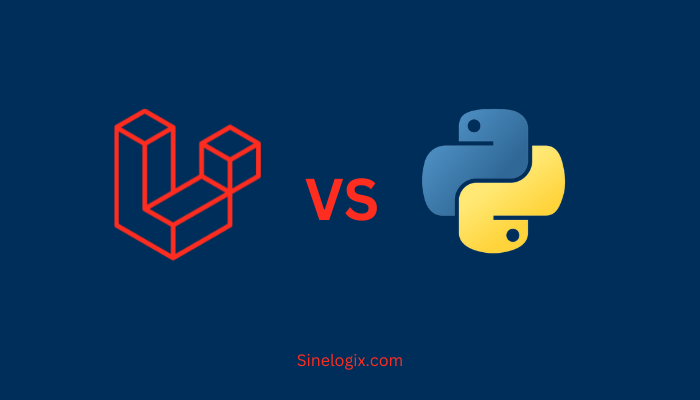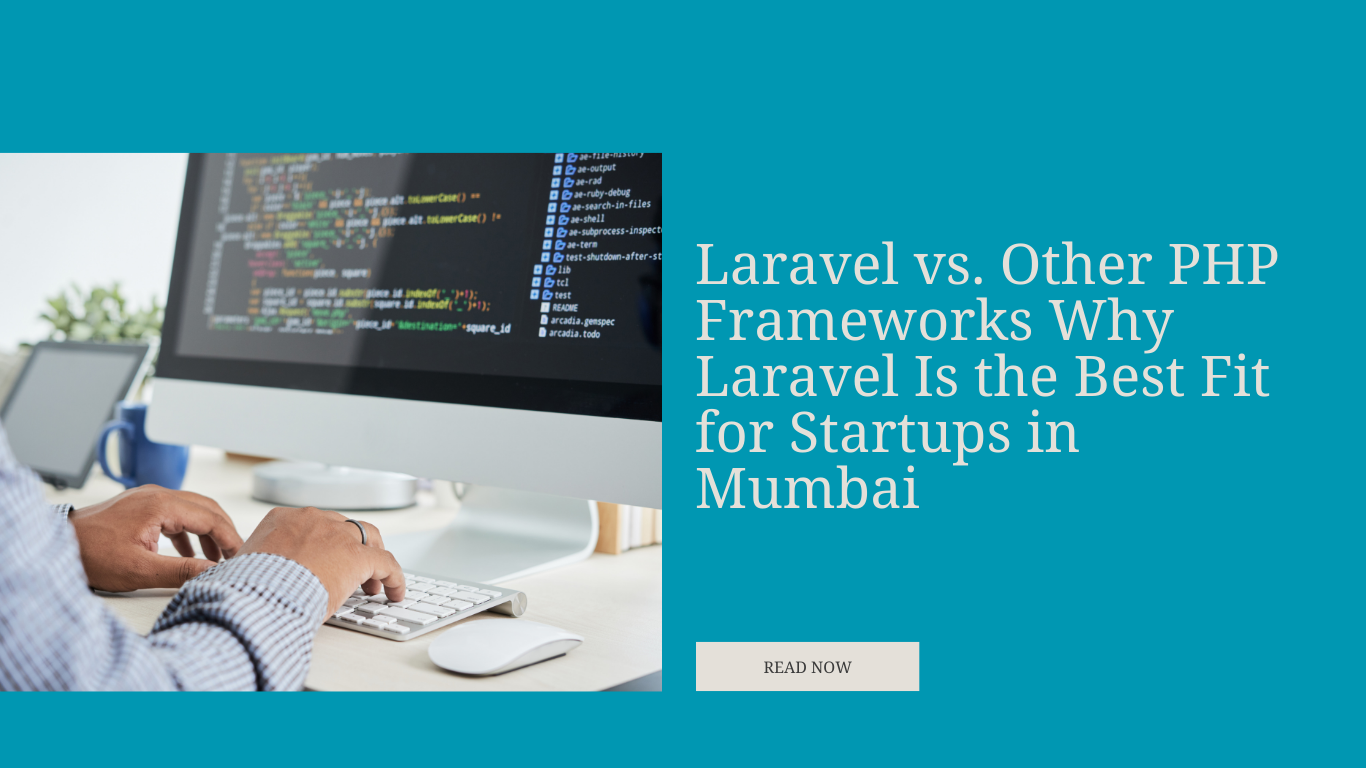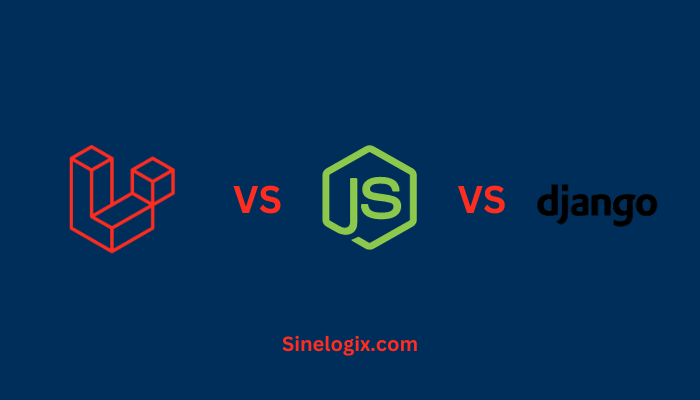Introduction to Laravel and Python
Laravel:
Laravel is a PHP-based web application framework known for its elegant syntax and robust features. It follows the Model-View-Controller (MVC) architectural pattern and provides a wide range of functionalities for building web applications, from authentication to database management, making PHP web development more efficient and structured.
Python:
Python is a high-level, versatile programming language known for its readability and simplicity. It’s used across various domains such as web development, data analysis, artificial intelligence, and scientific computing. Python offers a vast ecosystem of libraries and frameworks, making it a go-to language for diverse applications.
1. Syntax and Learning Curve
Laravel:
Laravel, being a PHP framework, requires knowledge of PHP. It has its own syntax and structure based on PHP, which might be easier for developers already familiar with PHP. However, for those new to PHP, there might be a learning curve in understanding Laravel’s specific conventions and functionalities.
Python:
Python’s syntax is often praised for its readability and simplicity. Its clear and straightforward syntax makes it relatively easy for beginners to pick up. Python’s simplicity and readability are major contributors to its popularity, attracting developers from diverse backgrounds.
2. Web Development Capabilities
Laravel:
Laravel is specifically designed for web application development. It provides features like routing, sessions, authentication, and templating engines, making web development more efficient. It follows the MVC pattern, offering a structured approach for building web applications.
Python:
Python’s capabilities for web development are often facilitated through web frameworks like Django and Flask. These frameworks provide similar functionalities to Laravel, allowing developers to build web applications using Python’s syntax and conventions.
3. Performance and Scalability
Laravel:
Laravel’s performance is influenced by PHP’s execution. It can handle high-traffic applications, but extensive features might affect performance. Laravel provides tools for caching and optimization, which aids in handling scalability.
Python:
Python’s performance is generally good, but it might not be as fast as lower-level languages like C or C++. However, when it comes to web applications, Python frameworks like Django and Flask are scalable and can handle a significant amount of traffic.
4. Community and Ecosystem
Laravel:
Laravel has a robust and growing community, offering extensive support, documentation, and a wide range of third-party packages and libraries. The Laravel ecosystem is continuously evolving, providing developers with a vast array of resources.
Python:
Python boasts a massive community and ecosystem. It offers a plethora of libraries and frameworks for various domains beyond web development, such as data science (NumPy, Pandas), machine learning (TensorFlow, scikit-learn), and more. This extensive ecosystem contributes to Python’s versatility.
5. Versatility
Laravel:
Laravel is specialized for web development using PHP. While it provides a comprehensive set of tools and features tailored for this purpose, it’s not as versatile as Python, which is applied across a multitude of domains.
Python:
Python’s versatility is one of its major strengths. From web development to scientific computing and machine learning, Python’s adaptability across diverse domains makes it a popular choice for developers.
6. Learning Resources and Documentation
Laravel:
Laravel offers extensive documentation and a vibrant community that provides tutorials, forums, and resources for developers. Learning resources specific to Laravel are abundant, aiding developers in mastering the framework.
Python:
Python’s learning resources are vast and diverse. It has extensive official documentation and a massive community contributing to numerous tutorials, forums, and online courses, making it an excellent language for beginners.
7. Adoption and Industry Usage
Laravel:
Laravel is widely used in the web development industry, especially in PHP-based projects. Its popularity has grown steadily, and it’s a favored choice for startups and enterprises building web applications.
Python:
Python’s usage spans across various industries. It’s heavily utilized in web development, data analysis, artificial intelligence, scientific computing, and more. Python’s versatility has led to its extensive adoption across different sectors.
8. Development Speed and Rapid Prototyping
Laravel:
Laravel’s extensive set of built-in features and a rich ecosystem of packages can significantly speed up web development. Its conventions and tools enable rapid prototyping and faster development cycles, making it suitable for quickly building web applications.
Python:
Python, especially when used with frameworks like Django and Flask, also offers rapid development capabilities. The simplicity and readability of Python’s syntax contribute to quicker prototyping, allowing developers to iterate on projects swiftly.
9. Deployment and Hosting
Laravel:
Deploying Laravel applications often involves hosting on PHP-supported servers. Many web hosting providers support PHP, making it relatively easy to deploy Laravel applications. Additionally, services like Laravel Forge and Envoyer provide streamlined deployment processes.
Python:
Deploying Python-based applications might involve a more varied hosting environment. For instance, Django applications might require hosting on servers that support Python frameworks, which may have specific requirements compared to standard PHP hosting.
10. Community Support and Job Market
Laravel:
Laravel’s community and job market focus primarily on web development within the PHP ecosystem. The demand for Laravel developers remains high, especially in businesses relying on PHP-based web applications.
Python:
Python’s community and job market are vast and diverse. Beyond web development, Python’s demand extends to fields like data science, artificial intelligence, and automation, resulting in a broader range of job opportunities for Python developers.
11. Learning Curve for Beginners
Laravel:
For beginners with no prior PHP experience, Laravel might have a steeper learning curve due to the need to learn PHP alongside Laravel’s conventions and features. However, for those already familiar with PHP, grasping Laravel might be relatively easier.
Python:
Python is often considered one of the most beginner-friendly programming languages. Its clear and intuitive syntax enables newcomers to learn programming concepts effectively, which may make it more accessible to beginners compared to learning PHP and Laravel simultaneously.
12. Maintenance and Upgrades
Laravel:
Laravel provides a clear upgrade path with well-documented procedures. Its version upgrades and long-term support (LTS) releases ensure stable and maintained applications. However, maintaining older versions might require attention to compatibility and updates.
Python:
Upgrading Python-based applications might also require attention to compatibility issues when transitioning to new versions. Python’s official support for older versions is limited, necessitating occasional updates to ensure application compatibility and security.
13. Security and Vulnerability Management
Laravel:
Laravel prioritizes security and provides built-in features like protection against common web vulnerabilities such as CSRF and SQL injection. Additionally, it offers authentication and authorization tools that aid in securing web applications.
Python:
Python’s security largely depends on how it’s used and the frameworks employed. For instance, Django, known for its strong security features, provides protection against common web vulnerabilities. However, developers need to implement security best practices within their Python applications.
14. Use Cases and Domains
Laravel:
Laravel’s primary use case is web development, especially for PHP-based web applications. It’s suitable for building websites, web apps, and web services using PHP.
Python:
Python’s applications extend across various domains including web development, data analysis, machine learning, artificial intelligence, automation, and scientific computing. Its versatility enables developers to work in diverse fields beyond web development.
15. Integration with Third-Party Services
Laravel:
Laravel integrates well with various third-party services through APIs and packages. It can easily connect with cloud services, payment gateways, social media platforms, and more using available extensions and APIs.
Python:
Python’s extensive library support facilitates seamless integration with third-party services. From API connections to utilizing libraries for various functionalities, Python’s wide range of available tools enables smooth integration with external services.
Related Articles:
Conclusion
The choice between Laravel and Python depends on the project’s nature, development goals, and the team’s expertise. Laravel excels in web development within the PHP ecosystem, offering a structured and robust environment. Python, with its extensive capabilities across multiple domains, provides a versatile platform suitable for diverse applications beyond web development.
Consider the specific requirements of your project, the expertise within your team, and the long-term objectives to make a well-informed decision between Laravel and Python for your development initiatives.




